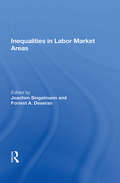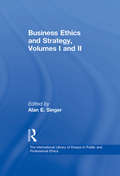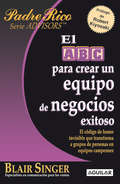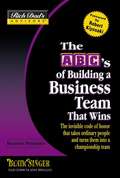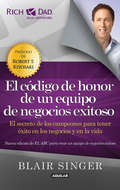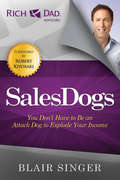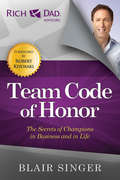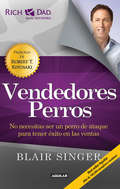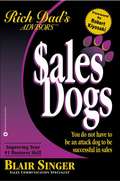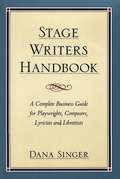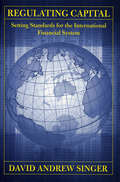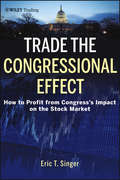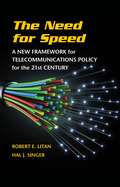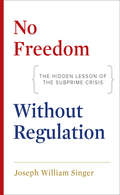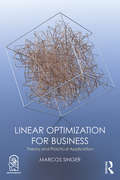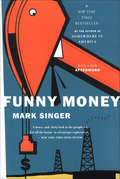- Table View
- List View
Introduction: Your Guide to Growth
by Joseph V. Sinfield Scott D. Anthony Mark W. Johnson Elizabeth J. AltmanThere is a general sense that a fog enshrouds the world of innovation, obscuring high-potential opportunities and making success a random and fleeting phenomenon. In contrast to conventional wisdom, this chapter contends that following the rights steps and putting in place the right structures can allow managers and entrepreneurs to improve significantly the odds of creating profitable growth businesses.
Mastering Emergent Strategies: Taking Uncertain Ideas Forward
by Joseph V. Sinfield Scott D. Anthony Mark W. Johnson Elizabeth J. AltmanFollowing what is known as an "emergent strategy" can help companies improve their odds of success by systematically addressing the key risks and unknowns that typify highly uncertain ideas. This chapter describes three simple steps managers can follow to master emergent strategy processes.
Precursors to Innovation
by Joseph V. Sinfield Scott D. Anthony Mark W. Johnson Elizabeth J. AltmanBefore turning to individual innovation initiatives or innovation-specific structures, companies need to make sure they have the appropriate precursors for innovation. This chapter describes three critical precursors: a core business that is in control, a game plan for growth, and mastery of the resource allocation process.
Principles and Patterns of Disruptive Innovation
by Joseph V. Sinfield Scott D. Anthony Mark W. Johnson Elizabeth J. AltmanThis chapter highlights key innovation traps and summarizes the processes and principles that will significantly increase your chances of creating growth through innovation.
Organizing to Innovate: Building Your Innovation Capability
by Joseph V. Sinfield Scott D. Anthony Mark W. Johnson Afarin Bellisario Steven C. Wheelwright Elizabeth J. AltmanSuccess requires going beyond winning once to developing deep capabilities that allow a company repeatedly to disarm disruptive threats and seize new opportunities. This chapter describes how companies can build innovation structures that help them address specific innovation challenges and surround those structures with the appropriate systems and culture.
Inequality In Labor Market Areas
by Joachim SingelmannDuring the past two decades, many attempts have been made to refocus stratification research and the study of inequality. The contributors to this volume have a long-term concern with the importance of space and locality. Many of them belonged to a research project during the early 1980s that had as one of its main aims the analysis of labor force
Business Ethics and Strategy, Volumes I and II (The International Library of Essays in Public and Professional Ethics)
by Alan E. SingerThis volume is intended as a reference for those interested in the relationship between business strategy and business ethics, broadly conceived. Several articles have been selected from various leading journals in management, strategy and ethics. An introductory chapter provides an overview of the articles but it also relates them systematically to a fundamental dualism involving values, ethics and politics, all viewed from the perspective of business and business studies.
El ABC para crear un equipo de negocios exitoso
by Blair SingerUn libro que te dará una gran ventaja sobre el mercado y más aún, sobre el desempeño de tu gente. El código de honor invisible que transforma a grupos de personas en equipos campeones. Prólogo de Robert Kiyosaki. Descubre cómo atraer a los mejores jugadores para tu negocio, garantizar que todos los miembros de tu equipo tengan un máximo desempeño, transformar a las personas ordinarias en campeones, infundir lealtad y confianza en tu equipo para que permanezca unido bajo presión, eliminar los estresantes roces personales en tu empresa y crear equipos de campeonato en tu lugar de trabajo, tu comunidad y tu hogar. El ABC para crear un equipo de negocios exitoso te ayudará a: - Atraer a los mejores jugadores para tu negocio; - Garantizar que todos los miembros de tu equipo tengan un máximo desempeño; - Transformar a las personas ordinarias en campeones; - Infundir lealtad y con?anza en tu equipo para que permanezca unido bajo presión; - Eliminar los estresantes roces personales en tu empresa; - Usar la presión como un aliado para generar resultados extraordinarios; y. - Crear equipos de campeonato en tu lugar de trabajo. tu comunidad y tu hogar.
The ABC's of Building a Business Team That Wins
by Blair SingerGreat champions have one thing in common: They know how to work as a team. This book offers a set of simple, powerful rules to govern the internal behaviors of businesses, organizations, families, and individuals in order to create championship results any time, any place.
El código de honor de un equipo de negocios exitoso.: El secreto de los campeones para tener éxito en los negocios y en la vida
by Blair SingerEl secreto de los campeones para tener éxito en los negocios y en la vida¡Mejora tus ventas, haz inversiones asertivas y logra un crecimiento vertical!La clave para impulsar tu empresa son las personas que conforman tu equipo de negociosEste libro es una guía paso a paso para cualquier individuo, grupo o empresa que quiera crear su propio código de honor. El código de honor de un equipo de negocios exitoso te enseñará cómo el proceso de creación de equipos es el eje central de los negocios, las inversiones, la iniciativa empresarial, e incluso la vida personal.El código de honor para un equipo de negocios exitoso brinda pasos específicos, ejemplos gráficos, historias y numerosos estudios de caso para que puedas:Crear tu propio código de honor. Aplicar y hacer cumplir el código de honor rápidamente.Utilizar el código para controlar el crecimiento en tu organización.Construir tu equipo de negocios con los jugadores adecuados.Aumentar el rendimiento de tu equipo.Usar la presión a tu favor para producir resultados extraordinarios.
Sales Dogs
by Blair SingerThe number one skill for any entrepreneur or business owner is the ability to sell. Why? Because sales = income. Yet, many fail financially not because they do not have great ideas or even good work ethic, but typically because they don't know how to, refuse to, are afraid to, or don't think it is important to know how to sell. SalesDogs was written as the very first of the Rich Dad Poor Dad "how-to" Advisory series to teach in a very fun and impactful way how to overcome the fears, the myths and the obstacles to selling your products, services or yourself. It then teaches a simple, time-proven process of selling that will generate great income in most any business. The reader will learn the five most important selling skills to master, how to overcome any objection, manage a territory and much more.The book quickly de-bunks the idea that you have to be an overly aggressive "attack dog" to be successful. It uses the metaphor of "man's best friend" to say that a great sales person is like a loyal, persistent and lovable canine. It stipulates that there are five different "breeds" or personalities of SalesDogs that can each make a lot of money by playing to its strength. You will learn how to identify, maximize and train to that strength and also how to teach others on your team to do the same.While the book is fun and engaging, it also dives deep into the personal development issues that block a person's ability to generate income and how to overcome them. The book is perfect for first time salespeople, individuals who are uncomfortable with the notion of "selling", those who need to train others to sell and those who want to simply get better quicker.
Team Code of Honor
by Blair SingerEvery great team, culture, society, religion or business that has endured time, adversity and challenge has always had one thing in common: a set of simple but powerful rules that govern the internal behaviors and expectations of that group. It is called The Code of Honor. We hear of these Codes when we think of things like The Ten Commandments, the Marine Corps or the Constitution. Yet if sales is the number one skill in business, number two has to be the ability to bring ordinary people together to build a championship team. This does not happen by chance or by the simple accumulation of talent. The Code is the core ingredient to creating winning organizations. The book is a step-by-step guide for any individual, group or company to actually create a Code of Honor specific to their team. The Rich Dad Poor Dad Advisor series was designed as a "how-to" series to empower individuals to succeed in the world of business and finance. "Team Code of Honor" is critical to this series because its processes bridge all facets of business, investment, entrepreneurship and even personal life. The book explains through graphic examples, stories and numerous case studies how a Code or set of rules is created, maintained, enforced and used for rapid and controlled growth of any entity.The book is designed as an operating manual for putting any business team together. It steps you all the way from properly choosing players, to creating the Code, to increasing performance and to winning. Each chapter gives the team specific assignments and examples so that by the time you have completed the book, your Code is in place and your team is operating at a true championship level.
Vendedores Perros
by Blair SingerPrologue by Robert Kiyosaki By knowing the five basic breeds of people -the Pit Bull, the Golden Retriever, the Poodle, the Chihuahua, and the Basset Hound -readers will have the necessary insight to improve their business and sales. This book will reveal five simple but critical revenue-generating skills to generate endless streams of qualified buyers and life-long sales and teach you how to radically change your attitude and direct your financial results.
Vendedores Perros: No Necesitas Ser Un Perro De Ataque Para Tener Éxito En Las Ventas
by Blair SingerVendedores perros es una guía para encontrar en nosotros al vendedor estrella. Bestseller con más de 100 mil ejemplares vendidos. Domina las ventas y conviértete en millonario. Descubre cómo vender tu producto en el mundo de los negocios. Vendedores Perros es un bestseller internacional que ha inspirado a pequeños empresarios, vendedores y dueños de negocio en todo el mundo por casi una década. Su mensaje es claro: la diferencia entre tener "una idea millonaria" y realmente ser millonario, es tu habilidad para vender tu idea, concepto, servicio o producto. Ya sea que estés buscando trabajo, reclutando un excelente equipo, vendiendo un servicio, incrementando tu capital, o simplemente convenciéndote... las ventas es tu habilidad número uno. Vendedores Perros te ayudará a: revelar las cinco habilidades simples pero críticas generadoras de ingresos que pueden explotar tu poder adquisitivo; identificar tu "raza" de vendedor perro, para aprovechar tus fortalezas y experimentar una alta efectividad; superar cualquier miedo, duda, o negación que tengas acerca de las ventas; cambiar radicalmente tu actitud en 30 segundos o menos, para que estés en un nivel de confianza óptimo en cualquier situación; tener la habilidad de cambiar cualquier "no" en "sí" -sin importar con quién estés hablando; adquirir las herramientas y tips necesarios para inspirar y dirigir a cualquier esquipo de ventas. http://www.megustaleer.com.mx/
Sales Dogs: You Do Not Have to Be an Attack Dog to Be Successful in Sales (Rich Dad Advisor's Series)
by Blair Singer Robert T. KiyosakiSALESDOGS reveals how knowing the characteristics and interactions of the five basic 'breeds' of people will be sure to help anyone improve their business and selling savvy. Different workers have the personality traits of different breeds of dogs. This is the idea behind SALESDOGS, a clever business book in which sales expert Blair Singer reveals how anyone can learn what their natural strengths and weaknesses are in order to achieve best possible results. With information on a variety of sales topics-from dealing with 'big dogs' to protecting one's territory-SALESDOGS is a fun new way of looking at the sales game.
Stage Writers Handbook
by Dana SingerDana Singer, Associate Director of America's foremost playwrights' association, the Dramatists Guild, gathers all the information and ideas stage writers need to conduct their careers in a businesslike manner, with all the protections the law provides. Includes chapters devoted to copyright, self-promotion, representation, production contracts, publishing and licensing agreements, underlying rights and collaboration.
Regulating Capital: Setting Standards for the International Financial System
by David Andrew SingerFinancial instability threatens the global economy. The volatility of capital movements across national borders has led many observers to argue for a reformed "global financial architecture," a body of consistent rules and institutions to prevent financial crises. Yet regulators have a decidedly mixed record in their attempts to create global standards for the financial system. David Andrew Singer seeks to explain the varying pressures on regulatory agencies to negotiate internationally acceptable rules and suggests that the variation is largely traceable to the different domestic political pressures faced by regulators. In Regulating Capital, Singer provides both a theory of the effects of domestic pressures on international regulation and a detailed analysis of regulators' attempts at international rulemaking in banking, securities, and insurance. Singer addresses the complexities of global finance in an accessible style, and he does not turn away from the more dramatic aspects of globalization; he makes clear the international implications of bank failures and stock-market crashes, the rise of derivatives, and the catastrophic financial losses caused by Hurricane Katrina and the events of September 11.
Trade the Congressional Effect: How To Profit from Congress's Impact on the Stock Market (Wiley Trading #570)
by Eric T. SingerAn innovative investment approach that takes the actions of the U.S. Congress into consideration Historical research indicates that, more often than not, when Congress is in session there is a negative effect on equities markets (the "Congressional Effect") due possibly to investor uncertainty surrounding government action or inaction as well as the unintended consequences of Congressional legislative initiatives on the stock market. Author Eric Singer, a financial professional with over twenty-five years of experience, is an expert on this phenomenon, and with this new book he shares his extensive insights with you. Trade the Congressional Effect skillfully details how you can profit from Congress's impact on the stock market. Along the way, it puts this approach in perspective and gives you all the tools you'll need to profitably incorporate it into your investing endeavors. Singer walks you through the process of trading the Congressional Effect and provides practical guidance regarding the possible pitfalls and opportunities you'll face each step of the way. Addresses why it is better to invest while Congress isn't in session Reveals exactly what the Congressional Effect encompasses and why it occurs Written by Eric Singer, one of the first people to publicly document the general effect of Congress on daily stock prices Supported by over forty-five years of real world data, the Congressional Effect has proven profitable to those who know how to use it. This timely guide will show you exactly what it takes to make this phenomenon work for you.
The Need for Speed: A New Framework for Telecommunications Policy for the 21st Century
by Hal J. Singer Robert E. LitanThe twenty-first-century telecommunications landscape is radically different from the one that prevailed as recently as the last decade of the twentieth century. <P><P>Robert Litan and Hal Singer argue that given the speed of innovation in this sector, the Federal Communications Commission's outdated policies and rules are inhibiting investment in the telecom industry, specifically in fast broadband networks. This pithy handbook presents the kind of fundamental rethinking needed to bring communications policy in line with technological advances.Fast broadband has huge societal benefits, enabling all kinds of applications in telemedicine, entertainment, retailing, education, and energy that would have been unthinkable a few years ago. Those benefits would be even greater if the FCC adopted policies that encouraged more broadband providers, especially wireless providers, to make their services available in the roughly half of the country where consumers currently have no choice in wireline providers offering download speeds that satisfy the FCC's current standards.The authors' recommendations include allowing broadband providers to charge for premium delivery services; embracing a rule-of-reason approach to all matters involving vertical arrangements; stripping the FCC of its merger review authority because both the Federal Trade Commission and the Justice Department have the authority to stop anticompetitive mergers; eliminating the FCC's ability to condition spectrum purchases on the identity, business plans, or spectrum holdings of a bidder; and freeing telephone companies from outdated regulations that require them to maintain both a legacy copper network and a modem IP network.These changes and others advanced in this book would greatly enhance consumer welfare with respect to telecommunications services and the applications built around them.
Educating for Sustainability in Japan: Fostering resilient communities after the triple disaster (Routledge Studies in Sustainable Development)
by Jane Singer Tracey Gannon Fumiko Noguchi Yoko MochizukiEducating for Sustainable Development (ESD) approaches are holistic and interdisciplinary, values-driven, participatory, multi-method, locally relevant and emphasize critical thinking and problem-solving. This book explains how ESD approaches work in the Japanese context; their effects on different stakeholders; and their ultimate potential contribution to society in Japan. It considers ESD in both formal and informal education sectors, recognizing that even when classroom learning takes place it must be place-based and predicated on a specific community context. The book explores not only ‘Why ESD’, but why and how ESD in Japan has gained importance in the past decade and more recently in the wake of the triple disaster of March 2011. It considers how ESD can help Japan recover and adapt to disasters and take initiative in building more resilient and sustainable communities. This volume asks the questions: What are some examples of positive contributions by ESD to sustainability in Japan? What is the role of ESD in Japan in activating people to demand and work towards change? How can schools, universities and non-governmental organizations link with communities to strengthen civic awareness and community action? After an introduction that elucidates the roots and recent promotion of ESD in Japan, part one of this volume looks at the formal education sector in Japan, while part two examines community-based education and sustainability initiatives. The latter revisits the Tohoku region five years on from the events of March 2011, to explore recovery and revitalization efforts by schools, NGOs and residents. This is an invaluable book for postgraduate students, researchers, teachers and policy makers working on ESD.
Hair and Fibers (Forensic Evidence Ser.)
by Jane Singer John D WrightThis introductory text on labour economics covers topics such as: the shift in America from a manufacturing-based economy to a service economy; the changes in the economic conditions in the US; the implications of NAFTA and GATT; and the labour markets.
No Freedom without Regulation
by Joseph William SingerAlmost everyone who follows politics or economics agrees on one thing: more regulation means less freedom. Joseph William Singer, one of the world's most respected experts on property law, explains why this understanding of regulation is simply wrong. While analysts as ideologically divided as Alan Greenspan and Joseph Stiglitz have framed regulatory questions as a matter of governments versus markets, Singer reminds us of what we've willfully forgotten: government is not inherently opposed to free markets or private property, but is, in fact, necessary to their very existence. Singer uses the recent subprime crisis to demonstrate: Regulation's essential importance for freedom and democracy Why consumer protection laws are a basic pillar of economic freedom How private property rests on a regulatory infrastructure Why liberals and conservatives actually agree on these relationships far more than they disagree This concise volume is essential reading for policy makers, philosophers, political theorists, economists, and financial professionals on both sides of the aisle.
Unbundling the Corporation
by Marc Singer John HagelNo matter how monolithic they may seem, most companies are really engaged in three kinds of businesses. One business attracts customers. Another develops products. The third oversees operations. Although organizationally intertwined, these businesses have conflicting characteristics. It takes a big investment to find and develop a relationship with a customer, so profitability hinges on achieving economies of scope. But speed, not scope, drives the economics of product innovation. And the high fixed costs of capital-intensive infrastructure businesses require economies of scale. Scope, speed, and scale can't be optimized simultaneously, so trade-offs have to be made when the three businesses are bundled into one corporation. Historically, they have been bundled because the interaction costs--the friction--incurred by separating them were too high. But we are on the verge of a worldwide reduction in interaction costs, the authors contend, as electronic networks drive down the costs of communicating and of exchanging data. Activities that companies have always believed were central to their businesses will suddenly be offered by new, specialized competitors that won't have to make trade-offs. Ultimately, the authors predict, traditional businesses will unbundle and then rebundle into large infrastructure and customer-relationship businesses and small, nimble product innovation companies. And executives in many industries will be forced to ask the most basic question about their companies: What business are we really in? Their answer will determine their fate in an increasingly frictionless economy.
Linear Optimization for Business: Theory and practical application
by Marcos SingerThis book takes a unique approach to linear optimization by focusing on the underlying principles and business applications of a topic more often taught from a mathematical and computational perspective. By shifting the perspective away from heavy math, students learn how optimization can be used to drive decision making in real world business settings. The book does not shy away from the theory underlying linear optimization but rather focuses on ensuring students understand the logic without getting caught up in proving theorems. Plenty of examples, applications and case studies are included to help bridge the gap between the theory and the way it plays out in practice. The author has also included several Excel spreadsheets, showing worked-out models of linear optimization that have been used to drive decisions ranging from configuring a police force to purchasing crude oil and media planning. How can the routes and pricing structures of airlines be optimized? How much should be invested in the prevention and punishment of crimes? These are everyday problems that can be solved using linear optimization, and this book shows students just how to do that. It will prove a useful, math-free resource for all students of management science and operations research.
Funny Money (Picador Bks.)
by Mark SingerNew York Times Bestseller: The “grandly entertaining” true story of an oil boom, an Oklahoma City bank, and a chain of crime, corruption, and collapse (Texas Monthly).The Penn Square Bank, located in an Oklahoma City shopping mall, started raking in money in the late 1970s making high-risk loans in the energy industry—and then selling them to other banks. Then came the summer of 1982, when the whole thing collapsed and took a lot of uninsured depositors down with it, as well as causing major losses at financial institutions coast to coast—and eventually sending an executive to jail.In this book, New Yorker writer Mark Singer recounts the whole spectacular story and makes brilliantly (and hilariously) clear what actually happened and why. Funny Money represents both a unique moment in the history of American banking and a timeless tale of frenzied, reckless greed.“[Singer] tells the tale with wonderful verve. He concentrates not on the financial complexities of the catastrophe but on the colorful people involved.” —The New York Times“Superbly researched and clearly written.” —The Cleveland Plain Dealer“Witty . . . This is a book that refutes anyone operating on the prejudice that business reporting must be dull.” —The Washington Post

